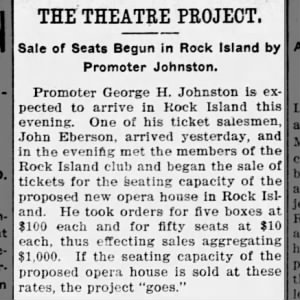
Grand Theatre
403 E. 2nd Street,
Muscatine,
IA
52761
![]() No one has favorited this theater yet
No one has favorited this theater yet
Additional Info
Previously operated by: Fox West Coast Theaters Corp.
Architects: George H. Johnston
Previous Names: Grand Opera House
Nearby Theaters
The Grand Opera House was opened on December 26, 1900 with the play “Shore Acres”. It was designed by architect George H. Johnston and soon to be architect John Eberson worked as an electrician installing the wiring. It had 1,100 seats, including eight boxes. The Grand Theatre was sold to Fox West Coast Theatres in 1929. It was listed as closed in 1940. The building was destroyed by fire in March 1945.
Just login to your account and subscribe to this theater.

Recent comments (view all 7 comments)
Muscatine’s Grand and Palace Theatres were sold by Midland Theatres to Fox West Coast Theatres in 1929, according to an item in Movie Age, November 2 that year. Both were among the Muscatine theaters operated at one time by Ludy Bosten, an exhibitor in the town from 1912 into the 1960s, according to an article about his career in the April 9, 1962, issue of Boxoffice Magazine.
The Grand Theatre’s demise was recorded by a brief item in the March 17, 1945, issue of Boxoffice, which said that the house had been destroyed by a fire the previous week.
According to a document prepared for the NRHP covering the history of Iowa opera houses from 1835 to 1940, the Grand Opera House in Muscatine was one of two Iowa houses designed by a St. Louis architect named George Johnston. He also designed the Midland Theatre in Fort Dodge, built in 1900. I’ve been unable to find any other information about George Johnston on the Internet.
As the earlier photo links are all dead, here are some photos of the Grand Opera House:
Exterior, October, 1901, which was probably around the time it opened.
Auditorium, around 1905.
A street scene with the Grand at right, taken in 1911.
Another exterior view from around 1910.
An exterior view from 1930.
A history of Muscatine published in 1911 has this paragraph about the Grand Opera House:
Film Daily Yearbooks from the 1930s give the seating capacity of the Grand Theatre as 700. I suspect that the boxes and perhaps a gallery had been closed.Opened December 26th, 1900 per this article
It was at this theatre that John Eberson began working with George Johnston, beginning his career.
That’s the story at least, but other earlier articles are turning up. 19 Jun 1900, Tue The Dispatch (Moline, Illinois) Newspapers.com
19 Jun 1900, Tue The Dispatch (Moline, Illinois) Newspapers.com
Additional history credit Jenny at the Musser Public Library. (accompanied circa 1910 photo added to gallery)
“The building was located on the corner of East Second and Walnut streets. It sat right next to Trinity Episcopal Church, which you can see in this photograph. Building of The Grand Opera House started in the spring of 1900 and finished in the fall of 1901. It had a seating capacity of 1,100 with eight private boxes and plush opera chairs. By 1945, the building was no longer used for lavish theater productions but instead was the home of two cafes, a barber shop, and several professional offices. The second floor had two apartment flats. The rest of the building was used for storage. On March 10, 1945 a fire of undetermined origin broke out and gutted the building. Two firefighters suffered burns but no one else was injured.”
From Little Known Stories of Muscatine, courtesy Musser Public Library:
The evening of December 26, 1900, was a big occasion in Muscatine, perhaps the most costly and best attended social event ever held in the Port City. On that evening more than 1,200 men, women, and children were present to witness the opening of Muscatine’s brand-new theatre, the Grand Opera House. The seats were ten dollars each, making the box office receipts for the night somewhere between $12,000 and $15,000. The show was a rather mediocre opus, somewhat typical of the late 1890 and 1900 stage offerings. Its name was “Shore Acres”…..There seemed to be a general feeling that at ten dollars per ticket, a more imposing theatrical offering might have been selected. However, the price of ten dollars per seat had not been fixed because of the quality of the show; it was just a method of financing the erection of the building.“ On March 10, 1945 the building was destroyed by fire.